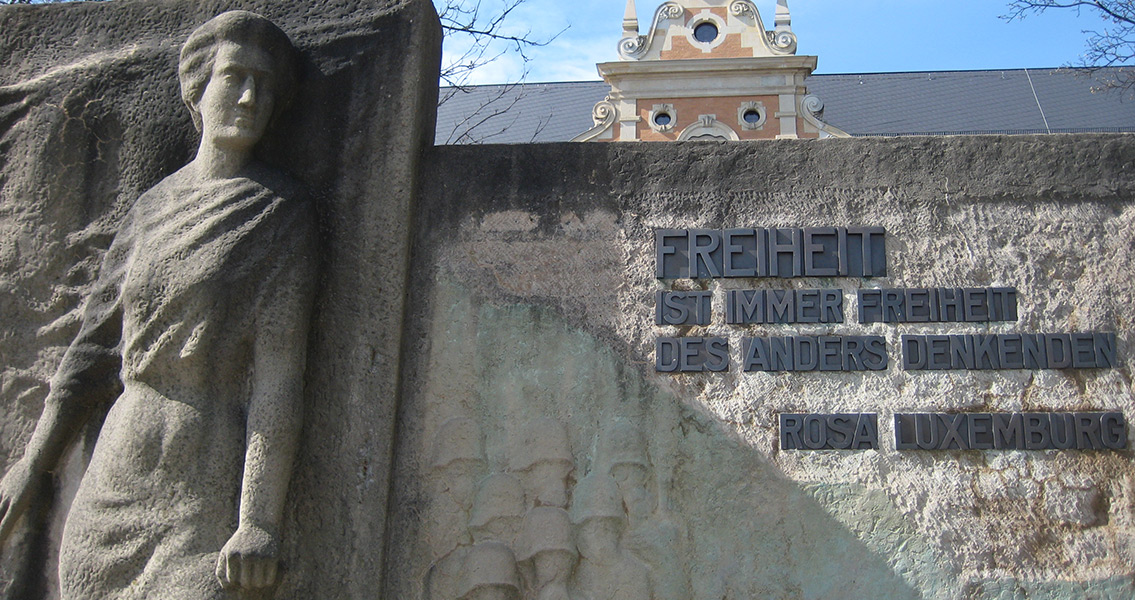<![CDATA[On 5th March 1871, Rosa Luxemburg, the future leader of a revolutionary faction of the German Socialist Party, was born in Zamość, Poland. Luxemburg is remembered as a key figure in the history of Socialist political thought, one who challenged the implementation of Socialism and Communism, as much as the systems of Capitalist societies. When Luxemburg was born, Zamość was still a part of Russia. This sense of existing between Germany and Russia was a theme that would resurface throughout Luxemburg's life. Along with her Polish identity, her politics and writings were defined by their engagement with the historical realities in Russia and Germany in the early twentieth century. Born into a lower-middle class Jewish family, Luxemburg's interest in politics started while she was still at school. Her adolescence also revealed her early disregard for authority, when she was refused a gold medal at her graduation from the Warsaw gymnasium because of her "oppositional attitude towards authorities". As was common among young socialists living in Russia in this period, she moved to Zurich for her university studies in 1889, in an attempt to escape the repressive Tsarist regime of Russia. In 1898 Luxemburg married Gustav Lubeck, a German worker, allowing her German citizenship. She moved to Berlin that year, and became affiliated with the German Social Democratic Party, known as the SPD. Her time in Berlin saw Luxemburg develop into a prolific writer and commentator. Of particular inspiration to her was the Russian Revolution of 1905, an event led and organised by worker's organisations. Luxemburg believed that revolution could be achieved in the present, and her attempts to call party members into action at the 1905 SPD Conference saw the beginnings of the disagreements that would ultimately lead her to break away from the party. In 1914, Luxemburg and the German socialist Karl Liebknecht separated from the SPD and formed the Spartacist League. The main reason for the split was the SPD's backing of German involvement in the First World War. Luxemburg and Liebknecht viewed the SPD's actions as a betrayal of the working class, condoning a conflict which was motivated purely by the interests of imperialism. Following a demonstration in 1916, Luxemburg was arrested for the remainder of the war, only being released by an amnesty for political prisoners in 1918. The Spartacist League turned into the Communist Party of Germany (KPD), and became a significant force in the tumult and uncertainty of post-war Berlin. Tragedy finally struck in January 1919, after some elements of the party went to Berlin with the intention of launching a rebellion to topple the coalition government of Max von Baden and Friedrich Ebert. Luxemburg was reluctant to launch a rebellion without guarantees of popular support, but elements of the party nevertheless initiated their attack on the government. In the violent mayhem that followed the German army's suppression of the uprising, Luxemburg and Liebknecht were killed, although exact details of how and when are unclear. Luxemburg is so well remembered because of the intensity with which she campaigned for her beliefs, as well as her willingness to question left-wing as much as right wing doctrines. Alongside her criticism of the SPD in Germany, she disputed the arguments of some of the most prominent socialists and communists, at times even reappraising the works of Marx himself. In 1904, Luxemburg published 'Organizational Questions of the Russian Democracy', a pamphlet where she criticised Lenin's advocacy of a centralised Committee with authority over local administrations in a Communist state. Pertinently, considering the eventual trajectory the USSR would take, she linked Lenin's system with Communist dictatorship. Two years after her death, Luxemburg's lover, Paul Levi, published a pamphlet she had written criticising the suppression of democracy in the Soviet Union. The work was of course treated as heresy in Stalinist Russia, and any copies of it were censored and strictly controlled in a Moscow archive. Luxemburg was a key figure in German politics at the start of the twentieth century, and a renowned campaigner for political change. More significantly, her life was a reminder that it was possible to advocate Communism without championing dictatorship. Image courtesy of Wikimedia commons user: Vwpolonia75 ]]>
The Anniversary of Rosa Luxemburg's Birth
